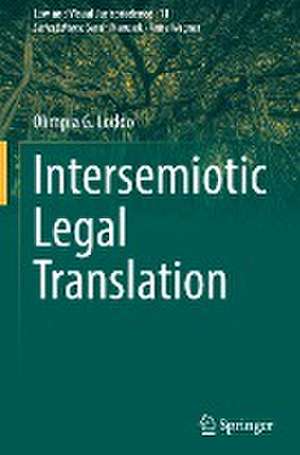Intersemiotic Legal Translation: Law and Visual Jurisprudence, cartea 11
Autor Olimpia G. Loddoen Limba Engleză Hardback – 22 noi 2023
The translation of legal documents in today’s globally interconnected world calls for novel approaches to overcoming traditional language barriers. The verbal language used in legal documents can be accompanied or even replaced by various types of semiotic resource, such as symbols, diagrams, and icons, while the advancement of digital tools and the introduction of new technologies offer those drafting contracts and other legal documents access to an ever-expanding toolbox for the translation process.
This book makes a significant contribution to the existing literature on legal translation and intersemiotic translation by sharing valuable insights and opening up new avenues of inquiry, fostering further exploration of this evolving domain and enabling practitioners to use these diverse communication tools responsibly and effectively.
Given the book’s structured multidisciplinary approach and extensive analyses of the characteristics of intersemiotic legal translation, its potential, and the complexities that arise at the intersection of law, language, and semiotics, it will appeal to legal practitioners, translators, semiotic scholars, and legal philosophers alike.
Whether you are a legal professional aiming to expand your expertise, an academic seeking a new research direction, or are simply intrigued by the fascinating interplay of law, language, and semiotics, this book offers a valuable resource that sheds light on the unique dynamics of translating legal concepts using approaches other than traditional verbal communication. As such, it is an essential read for anyone who is interested in the changing landscape of law, language, and translation.
Preț: 887.68 lei
Preț vechi: 1082.54 lei
-18% Nou
Puncte Express: 1332
Preț estimativ în valută:
169.85€ • 177.36$ • 140.26£
169.85€ • 177.36$ • 140.26£
Carte tipărită la comandă
Livrare economică 15-29 aprilie
Preluare comenzi: 021 569.72.76
Specificații
ISBN-13: 9783031441837
ISBN-10: 3031441834
Pagini: 105
Ilustrații: XIV, 105 p. 10 illus., 8 illus. in color.
Dimensiuni: 155 x 235 mm
Greutate: 0.35 kg
Ediția:1st ed. 2023
Editura: Springer International Publishing
Colecția Springer
Seria Law and Visual Jurisprudence
Locul publicării:Cham, Switzerland
ISBN-10: 3031441834
Pagini: 105
Ilustrații: XIV, 105 p. 10 illus., 8 illus. in color.
Dimensiuni: 155 x 235 mm
Greutate: 0.35 kg
Ediția:1st ed. 2023
Editura: Springer International Publishing
Colecția Springer
Seria Law and Visual Jurisprudence
Locul publicării:Cham, Switzerland
Cuprins
Introduction.- What Is Intersemiotic Legal Translation?.- Intersemiotic Legal Translation: Four Dimensions.- Intersemiotic Legal Translation as Target Representamen: Three Types of Intersemiotic Translation in the Legal Field.- Intersemiotic Legal Translation as a Process.- Intersemiotic Digital Legal Translation.- Conclusions.
Notă biografică
Dr. Olimpia G. Loddo has a philosophical and legal background and has carried out research professionally since 2010. She participated as a speaker and collaborated in the organisation of national and international conferences. Currently, she is part of a robust international and interdisciplinary research network on normativity as a member of the Executive Team of the research-network Normactivity. Her research interests range over various fields of application (customary law, background normativity, normative images, deontic artefacts) but can be largely attributable to the common thread of the theme of nonlinguistic forms of normativity and law.
Textul de pe ultima copertă
The translation of legal documents in today’s globally interconnected world calls for novel approaches to overcoming traditional language barriers. The verbal language used in legal documents can be accompanied or even replaced by various types of semiotic resource, such as symbols, diagrams, and icons, while the advancement of digital tools and the introduction of new technologies offer those drafting contracts and other legal documents access to an ever-expanding toolbox for the translation process.
This book makes a significant contribution to the existing literature on legal translation and intersemiotic translation by sharing valuable insights and opening up new avenues of inquiry, fostering further exploration of this evolving domain and enabling practitioners to use these diverse communication tools responsibly and effectively.
Given the book’s structured multidisciplinary approach and extensive analyses of the characteristics of intersemiotic legal translation, its potential, and the complexities that arise at the intersection of law, language, and semiotics, it will appeal to legal practitioners, translators, semiotic scholars, and legal philosophers alike.
Whether you are a legal professional aiming to expand your expertise, an academic seeking a new research direction, or are simply intrigued by the fascinating interplay of law, language, and semiotics, this book offers a valuable resource that sheds light on the unique dynamics of translating legal concepts using approaches other than traditional verbal communication. As such, it is an essential read for anyone who is interested in the changing landscape of law, language, and translation.
Caracteristici
Explores new dimensions of legal design Enhances legal communication and legal translation beyond language Helps readers keep up with the changing legal landscape












